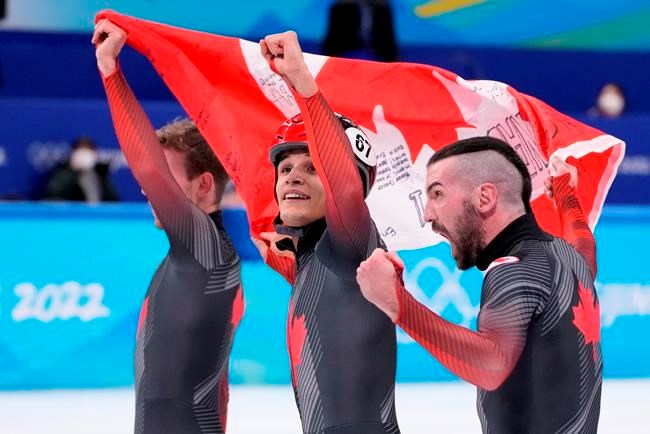"We do not do this for the medals. Do not misunderstand, we love to win, but it should be done in the proper way."
Given the current athlete unrest in Canadian high-performance sport, that statement by Norway's top Olympic official Tore Ovrebo seems profound.
With the word "joy" baked into its sport values, the northern country with less than a fifth of Canada's population has topped the medal table at the last two Winter Olympic Games.
Norway won in total medals (37) and gold medals (16) in Beijing's Winter Olympics in February, compared to Canada's 26, including four gold.
Joy is distinctly lacking in some sectors of Canadian high-performance sport. An unprecedented number of athletes are demanding cultural change from the organizations that oversee them.
New federal sports minister Pascale St-Onge says there's been accusations of maltreatment, sexual abuse or misuse of funds directed at least eight national sport organizations in her first five months in office and called the situation a crisis.
The trampling of athletes' mental and emotional health in pursuit of the money to win medals is a common thread in athletes' grievances.
Medals as a measurement of success isn't said to be the problem. The thorny question is how to pursue international sport glory with athlete wellness at the forefront, while also holding those in the high-performance sport system, including athletes, accountable for the over $200 million Canadian taxpayers spend annually on it.
Canada as a top-three country in the world in winter sport and top-12 in summer sport is a measurement of success people can understand, but how that's achieved is in a moment of reckoning.
"Using (medals) as a metric of success is OK, but is shouldn't be the only metric of success," two-time Olympic trampoline champion Rosie MacLennan said.
"How do we shift a short-term, peak-performance incentivized system to one that enables peak performance and high-performance environments while also nurturing the well-being and holistic health of athletes across the entire system? Probably easier said than done."
Norway and Canada have a lot in common in Olympic and Paralympic sport, including athletes who struggle financially to pursue their dreams.
"The normal high-performance young person in Norway is not well-off," said Ovrebo, manager of Olympiatoppen.
"They are driven by their motivation and their curiosity to find out how good they can get. That makes an even stronger ethical obligation for us to treat them well.
"Health will always be prioritized higher than performance if there is a conflict."
Strengthening the quality of relationships within national teams is one of Olympiatoppen's three stated core tasks, alongside strong daily training environments and preparation for and execution of competitions.
"The national teams are not only measured by the number of medals," Ovrebo said. "It's the way they treat each other.
"What we are doing here is to develop humans and sport is just the arena to do that. They are, first and foremost, human beings and they are, number two, athletes."
That philosophy is attractive to Canadian athletes.
"I think that's a fantastic way to go about things," said Olympic rugby player Nathan Hirayama. "You may see better results having players, athletes feeling their bests interests are being considered.
"If sport is something we want to nurture, we want these athletes to have the best careers possible. We want them to want to give back when they're done sport and not leave with a bitter taste in their mouth."
Changing culture takes time. Athletes' careers are not long.
And do Canadian athletes trust the organizations that run high-performance sport — Sport Canada, Own The Podium, the Canadian Olympic Committee, Canadian Paralympic Committee and over 60 national sport federations — to change a culture those organizations helped create?
"My belief is, yes, it can change. It will unfortunately take time and also real need to understand what the underlying root causes are and what the issues are, and who is ultimately responsible for making those changes," MacLennan said.
University of Toronto sport and public policy professor emeritus Bruce Kidd, a middle distance runner in the 1964 Olympic Games, calls for a loosening of ties between performance and funding.
"Funding is contingent on performance goals that are entirely podium-focused," Kidd said.
"There's got to be a funding formula that recognizes the values of the Physical Activity and Sport Act and making contributions towards those outcomes. I would include performance as one of the criteria, but no where near the top criterion.
"I hasten to point out nobody is saying we don't want to be very good at sport. Our athletes and coaches are competitive. You can treat somebody like a human, you can treat someone as a developing individual and still do very, very well in sport."
Sports psychologist Carla Edwards, who works with athletes as a mental health adviser, believes Canadian athletes can be well and win at the same time.
"The issue is how we've gone about it. The way we can arrive at that can change," she said. "Norway has proved that. We just need to buy into it.
"It may be a shift of a few years where we need to build a new system and an understanding of a way of being. I believe if we do that, a few years down the road we'll see it translate. Even in an abstract fashion, the athletes will be healthier, which really should be our goal.
"But recognizing the reality of funding, that's not really the goal of a lot of organizations."
This report by The Canadian Press was first published April 26, 2022.
Donna Spencer, The Canadian Press



